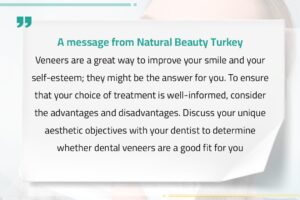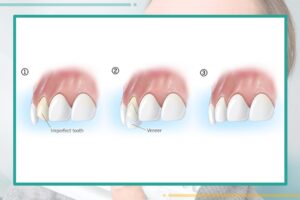Dental Veneers in Turkey
Custom-made shells called dental veneers are placed over the front surfaces of your teeth. They hide stains, chips, cracks, and other flaws in appearance. One of the most popular procedures in cosmetic dentistry is veneer placement. Various veneer varieties are offered based on your own objectives.
The front surfaces of your teeth are covered by veneers. To make them, technicians employ premium dental materials such as porcelain or composite that is tinted like teeth.
Veneers on teeth are just aesthetic. Numerous visual flaws, like as chips, cracks, gaps, discolored teeth, and more, can be hidden by them. Dental veneers are specialized fits intended to cover up or treat dental problems, such as: discolorations, chips, and little missing pieces.
Decay Misalignment Spaces between Teeth
With dental veneers, a person’s teeth can look better. They might be helpful for those seeking a long-term remedy for persistent cosmetic issues, especially if those issues don’t improve with other dental procedures like braces, tooth whitening, or retainers.
A dentist will usually remove a little portion of enamel, the teeth’s thin layer of protective enamel, during the installation procedure. As a result, once the veneers are placed by the dentist, they cannot be taken out or avoided.
Dental Veneers: Who Needs Them?
Veneers are an option for anyone looking to improve the appearance of their smile. These dental repairs have the ability to blend in:
– Damaged or chipped teeth.
– Diastema, or the spaces or gaps in your smile.
– Stains for which tooth whitening is ineffective.
– Teeth of insufficient size.
– Teeth that are not quite right.
Remember that veneers are only a possibility if you are clear of gum disease and severe cavities. Prior to considering cosmetic procedures, you should take care of any significant oral health problems you may have.
What Makes Crowns Different from Veneers?
To improve the appearance of a tooth, a porcelain veneer simply covers the front surface of the tooth. In contrast, a dental crown adds strength and protection by covering the whole tooth structure.
Veneers on the teeth are a cosmetic procedure. Put another way, they make you seem better, but they don’t always make your teeth stronger or fix them. Dental crowns are mostly used to repair teeth that have suffered significant damage from trauma or decay, though they can also make your teeth seem better.
Types of Dental Veneers in Istanbul
Indeed, Veneers come in a variety of forms, such as composite, porcelain, no-prep, and removable varieties.
Veneers Made of Composite Materials
Light cosmetic flaws can be hidden with composite veneers. To get the desired effects, your dentist utilizes tooth-colored composite resin, which is also used for dental bonding.
Porcelain Veneers
Several visual flaws can be fixed with porcelain veneers. These repairs are designed specifically to match the structure of your teeth. Your dentist will need to remove some enamel from your natural teeth before placing them. This helps your new veneers stay in place by roughening the surfaces of your teeth.
Veneers without Preparation
Veneers that require little to no preparation are a less invasive choice. No-prep porcelain veneers are created specifically for your smile, just like conventional veneers. Nevertheless, compared to conventional veneers, they require less enamel removal.
Removable Veneers
Removable veneers, sometimes referred to as pop-on or snap-on veneers, cover your natural teeth to conceal flaws. Just like retainers, detachable veneers are easily removed. While veneers can improve your smile, eating and speaking may become more challenging and your speech may become less clear.
Because removable veneers have only been around for a few years, there isn’t a lot of research on them. Find out from your dentist if this is a safe alternative for you.
Procedure Guidelines
How It Will Be Done?
Your dentist will evaluate your teeth and gums at your initial session to see if veneers are a good fit for you. If you qualify, they will remove a small bit of enamel from your teeth to prepare them. They will next take imprints of your teeth. These imprints will be used by a dental lab technician to create your personalized veneers. (If composite veneers are selected, no dental impressions are required.)
The dental lab may need several weeks to finish your veneers. In the meanwhile, your dentist might apply temporary veneers if needed. Your veneers will be shipped to your dentist’s office by the lab once the technician completes them.
What Distinguishes Implants, Crowns, and Veneers from One Another?
Crowns, veneers, and implants are dental procedures that can enhance a tooth’s aesthetic appeal. There are distinctions between them, though. The portion of the tooth that veneers, crowns, and implants cover is one distinction amongst them.
The front of a tooth is primarily covered by dental veneers. On the other hand, crowns completely enclose the front, back, and all sides of the tooth. Therefore, crowns are used by dentists to fix fractured teeth, even those with minimal remaining structure.
Additionally, crowns can strengthen the teeth they cover. In contrast, implants are bolt-like devices that affix to the jawbone in order to replace lost teeth.
A dentist may use an implant if necessary to hold a crown in place within the mouth. This could be the case if a person has lost a tooth or if a tooth needs to be extracted because it is too severely damaged.
In essence, crowns are used by dentists to repair severely damaged teeth, while implants are used to replace lost teeth. The appearance of teeth that are largely intact can be enhanced by veneers.
What Happens during Veneer Placement?
Your dentist will examine the fit, color, and form of your veneers during a follow-up appointment before applying dental cement to firmly adhere them in place. Lastly, they will examine your bite and make any required corrections.
Inform your dentist if you would like to alter the color or shape of your veneers. To make sure your results are good, they will collaborate with you and the dental laboratory.
There is no recovery period after veneer insertion. Following dental veneer placement, patients can resume their regular activities the same day. As long as the anesthesia wears off, you can also eat or drink right after your session.
Do Dental Veneers on Teeth Require Extra Care?
To maintain your veneers in good functioning order, all you need to do is brush, floss, and see your dentist on a regular basis. Use non-abrasive fluoride toothpaste and a toothbrush with soft bristles. Whitening products should be avoided since they may scratch your veneers.
Additionally, you should avoid biting into tough meats, apples, and carrots directly in order to prolong the life of your veneers. Chop up these meals and use your back teeth to eat them.
Even though porcelain veneers are stain resistant, it’s still a good idea to stay away from foods and drinks with dark colors, such berries, red wine, coffee, and tea. Your veneers may eventually get stained by these foods and beverages.
Pros and cons of Nose Lifting
Dental Veneers Pros and Cons
What Pros Can Dental Veneers Offer?
There are several advantages to dental veneers. As an illustration:
* Veneers can significantly improve the way your smile looks.
* For realistic effects, they match your natural teeth perfectly.
* Veneers are more stain-resistant than your teeth’s natural enamel.
* Maintaining dental veneers doesn’t involve any extra work.
* When given the right care, they can live for 10 to 15 years.
What Cons Can Veneers Have?
Additionally, veneers have specific drawbacks. As an illustration:
* At minimum, a portion of your natural enamel will be lost.
* Many varieties of veneers cannot be reversed.
* The sensitivity of your teeth to heat and cold may increase.
* Veneers have the potential to break loose or fall off.
* Since dental veneers are cosmetic, most insurance plans do not cover them.
Do you want to know the difference between Hollywood Smile and Bollywood Smile?
Do Veneers Cause Dental Damage?
No. Your teeth are not actively harmed by veneers. The underlying natural tooth structure could potentially deteriorate, though. For this reason, it’s critical to brush, floss, and schedule routine cleanings at the dentist.
Do Veneers Fade with Time?
The majority of dental veneer varieties are irreversible, meaning they cannot be removed. Certain veneer varieties, including minimal or no prep, can be reversed. Dental veneers often last ten to fifteen years with appropriate upkeep and care.
How Can I Maintain the Quality of my Veneers?
The following advice will help you maintain the excellent appearance and feel of your veneers:
– Using a soft-bristled toothbrush and nonabrasive fluoride toothpaste, brush your teeth at least twice a day.
– Once a day, floss between your teeth.
– Twice daily, use an antimicrobial mouthwash.
– Never open parcels or rip off clothes tags with your teeth as a tool.
– See your dentist for regular cleanings and examinations.
When to Make a Doctor’s Appointment?
Dental veneers can be an option for you if you’re not content with the way your smile looks. Discuss your aesthetic concerns with your dentist to see if veneers are a good option for you. Contact your dentist as soon as possible if you already have veneers and something doesn’t feel quite right.

Aftercare
- The dentist might wish to check the veneers during a follow-up session after they have been placed. They will check to see if the veneers have remained in place and are comfortable for the wearer during this time.
- This is a wonderful time for someone to mention any veneers that feel off because a dentist can assist make them right.
- Following their treatment, a person with new dental veneers is not need to abstain from any certain meals or beverages.
- Nevertheless, to extend the life of veneers, one may choose to stay away from red wine, coffee, and tea, as well as other foods and drinks that can discolor teeth.
The dentist might also suggest avoiding:
* Gnawing on hard surface and on nails
* Putting on a mouth guard
* Gritting one’s teeth
* Utilizing teeth to open objects and chewing extremely tough food
* It’s possible to see uneven areas on the veneers. With time, this ought to get better. If not, one can have their teeth smoothed by a dentist. The reason behind rough patches on veneers is usually the dentist’s excess bonding substance.
* Furthermore, even with veneers, a person can still get cavities, so maintaining proper oral hygiene is crucial. This includes brushing and flossing twice a day.
* Veneers should last approximately ten years with proper maintenance. A person might have to replace them after this period.
* Depending on the materials the dentist used and how well the patient takes care of them, veneers can have varying lifespans. One might discuss the timeline for replacing veneers with their dentist.






